Understanding the World of Tourism: Impacts & Development
VerifiedAdded on 2023/06/12
|8
|2016
|374
Report
AI Summary
This report provides a comprehensive analysis of the tourism industry, exploring the development of contemporary tourism and the significant factors influencing it. It delves into the positive and negative economic impacts, including revenue generation, employment opportunities, and potential hidden costs. The report also examines the environmental consequences, such as pollution and deforestation, alongside socio-cultural effects, both enriching cultural exchange and potential disruptions to local traditions. The conclusion emphasizes the need for sustainable practices and offers recommendations to mitigate negative impacts, such as responsible waste management and investment in eco-friendly tourism infrastructure. Desklib provides access to this report and other solved assignments for students.
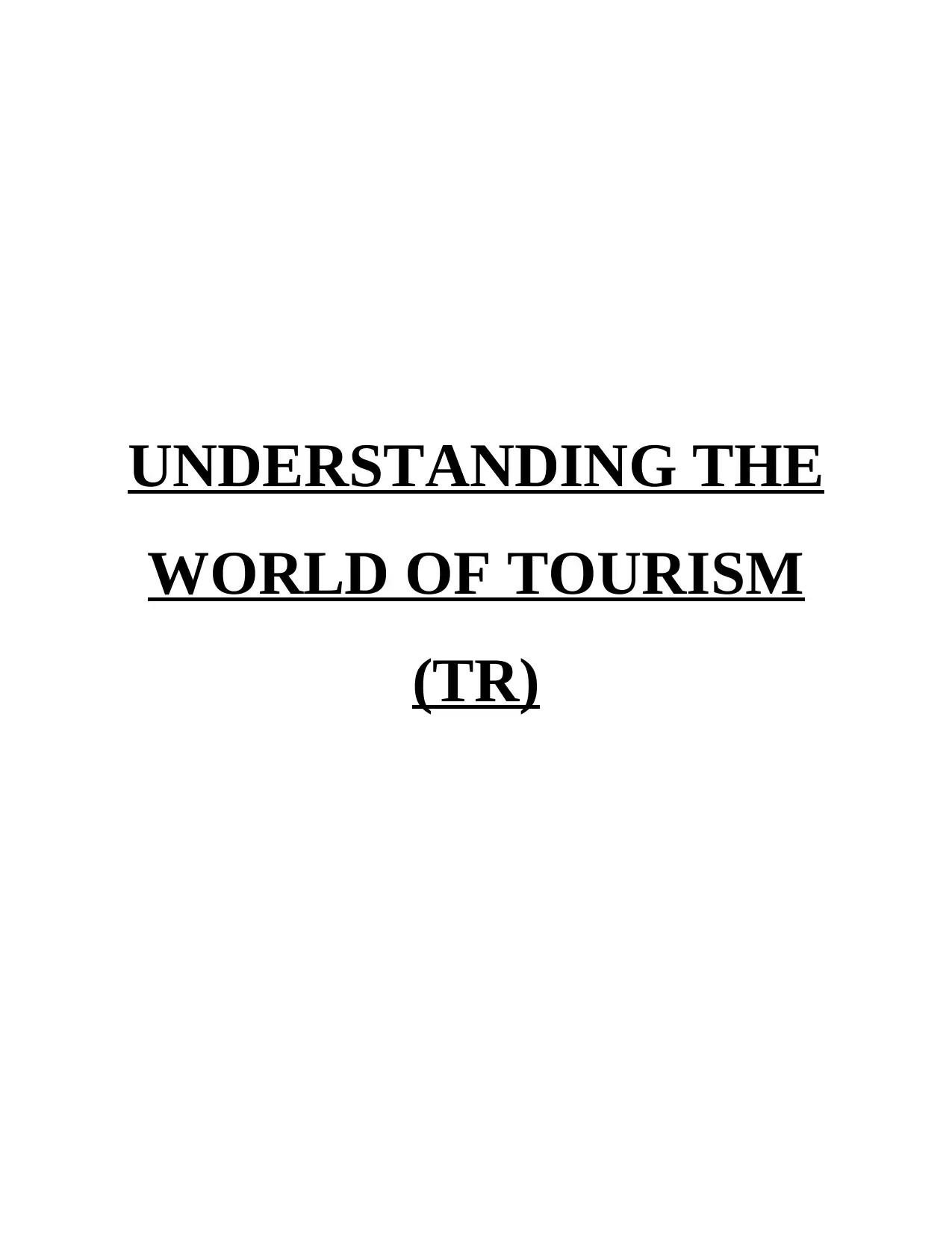
UNDERSTANDING THE
WORLD OF TOURISM
(TR)
WORLD OF TOURISM
(TR)
Paraphrase This Document
Need a fresh take? Get an instant paraphrase of this document with our AI Paraphraser
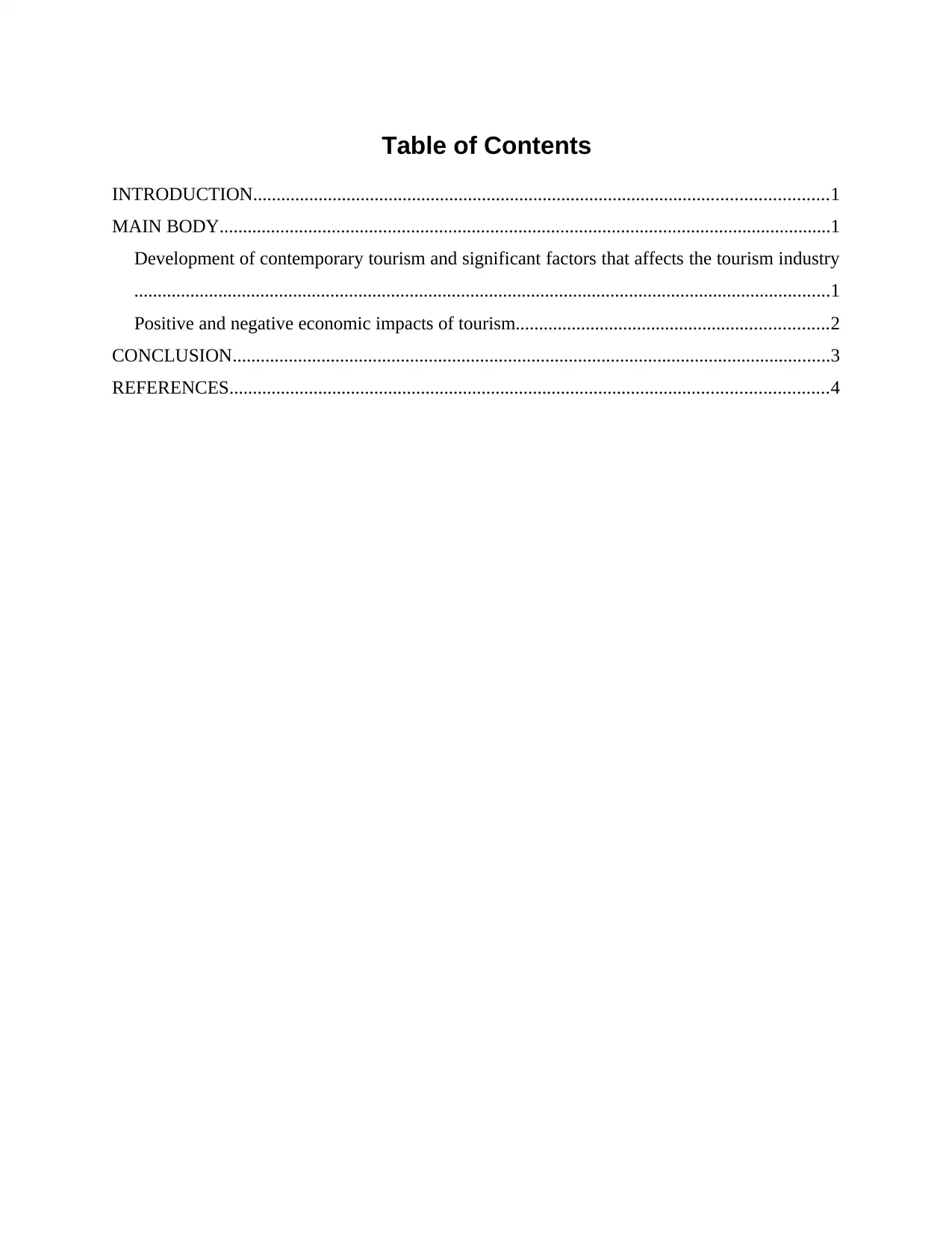
Table of Contents
INTRODUCTION...........................................................................................................................1
MAIN BODY...................................................................................................................................1
Development of contemporary tourism and significant factors that affects the tourism industry
.....................................................................................................................................................1
Positive and negative economic impacts of tourism...................................................................2
CONCLUSION................................................................................................................................3
REFERENCES................................................................................................................................4
INTRODUCTION...........................................................................................................................1
MAIN BODY...................................................................................................................................1
Development of contemporary tourism and significant factors that affects the tourism industry
.....................................................................................................................................................1
Positive and negative economic impacts of tourism...................................................................2
CONCLUSION................................................................................................................................3
REFERENCES................................................................................................................................4
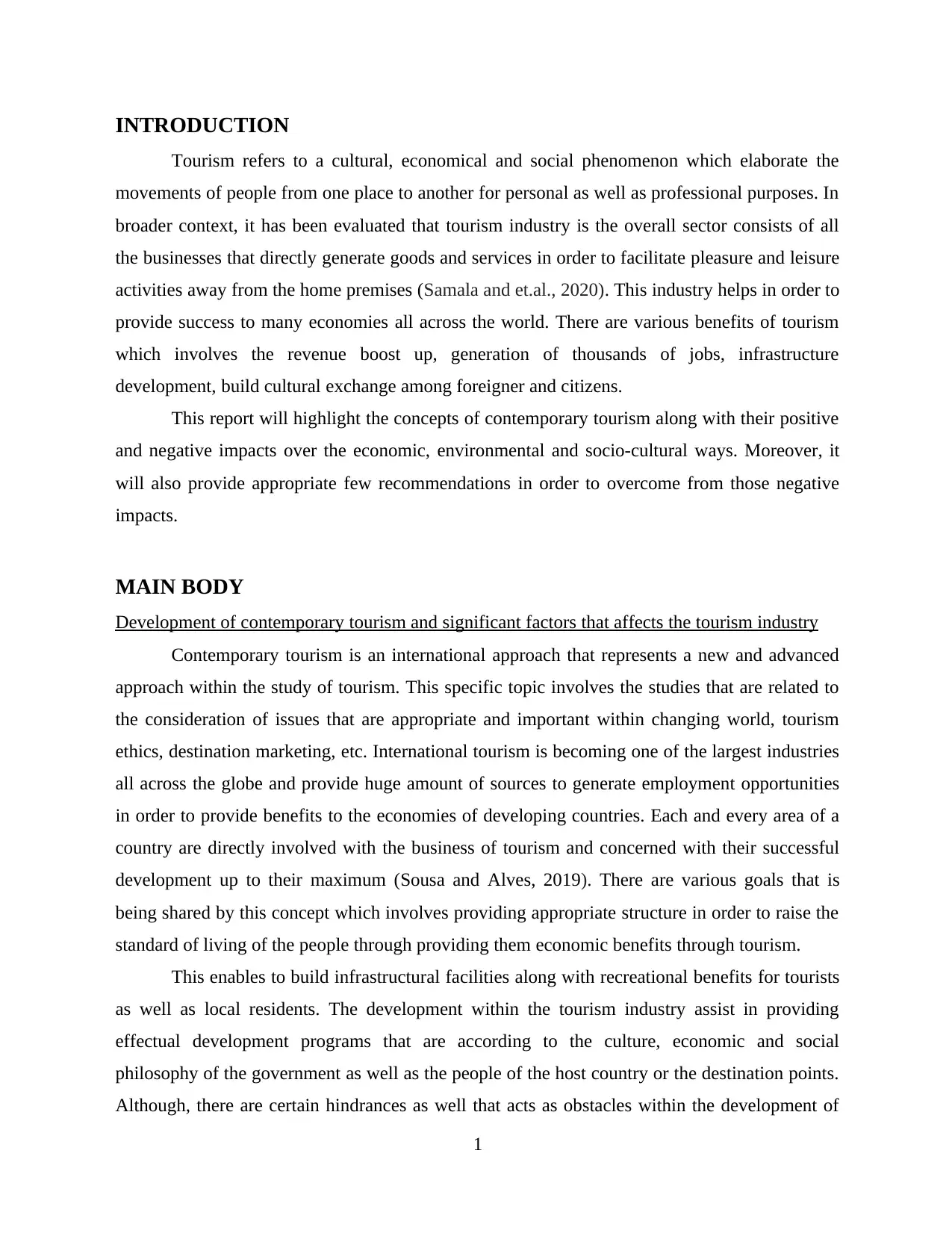
INTRODUCTION
Tourism refers to a cultural, economical and social phenomenon which elaborate the
movements of people from one place to another for personal as well as professional purposes. In
broader context, it has been evaluated that tourism industry is the overall sector consists of all
the businesses that directly generate goods and services in order to facilitate pleasure and leisure
activities away from the home premises (Samala and et.al., 2020). This industry helps in order to
provide success to many economies all across the world. There are various benefits of tourism
which involves the revenue boost up, generation of thousands of jobs, infrastructure
development, build cultural exchange among foreigner and citizens.
This report will highlight the concepts of contemporary tourism along with their positive
and negative impacts over the economic, environmental and socio-cultural ways. Moreover, it
will also provide appropriate few recommendations in order to overcome from those negative
impacts.
MAIN BODY
Development of contemporary tourism and significant factors that affects the tourism industry
Contemporary tourism is an international approach that represents a new and advanced
approach within the study of tourism. This specific topic involves the studies that are related to
the consideration of issues that are appropriate and important within changing world, tourism
ethics, destination marketing, etc. International tourism is becoming one of the largest industries
all across the globe and provide huge amount of sources to generate employment opportunities
in order to provide benefits to the economies of developing countries. Each and every area of a
country are directly involved with the business of tourism and concerned with their successful
development up to their maximum (Sousa and Alves, 2019). There are various goals that is
being shared by this concept which involves providing appropriate structure in order to raise the
standard of living of the people through providing them economic benefits through tourism.
This enables to build infrastructural facilities along with recreational benefits for tourists
as well as local residents. The development within the tourism industry assist in providing
effectual development programs that are according to the culture, economic and social
philosophy of the government as well as the people of the host country or the destination points.
Although, there are certain hindrances as well that acts as obstacles within the development of
1
Tourism refers to a cultural, economical and social phenomenon which elaborate the
movements of people from one place to another for personal as well as professional purposes. In
broader context, it has been evaluated that tourism industry is the overall sector consists of all
the businesses that directly generate goods and services in order to facilitate pleasure and leisure
activities away from the home premises (Samala and et.al., 2020). This industry helps in order to
provide success to many economies all across the world. There are various benefits of tourism
which involves the revenue boost up, generation of thousands of jobs, infrastructure
development, build cultural exchange among foreigner and citizens.
This report will highlight the concepts of contemporary tourism along with their positive
and negative impacts over the economic, environmental and socio-cultural ways. Moreover, it
will also provide appropriate few recommendations in order to overcome from those negative
impacts.
MAIN BODY
Development of contemporary tourism and significant factors that affects the tourism industry
Contemporary tourism is an international approach that represents a new and advanced
approach within the study of tourism. This specific topic involves the studies that are related to
the consideration of issues that are appropriate and important within changing world, tourism
ethics, destination marketing, etc. International tourism is becoming one of the largest industries
all across the globe and provide huge amount of sources to generate employment opportunities
in order to provide benefits to the economies of developing countries. Each and every area of a
country are directly involved with the business of tourism and concerned with their successful
development up to their maximum (Sousa and Alves, 2019). There are various goals that is
being shared by this concept which involves providing appropriate structure in order to raise the
standard of living of the people through providing them economic benefits through tourism.
This enables to build infrastructural facilities along with recreational benefits for tourists
as well as local residents. The development within the tourism industry assist in providing
effectual development programs that are according to the culture, economic and social
philosophy of the government as well as the people of the host country or the destination points.
Although, there are certain hindrances as well that acts as obstacles within the development of
1
⊘ This is a preview!⊘
Do you want full access?
Subscribe today to unlock all pages.

Trusted by 1+ million students worldwide
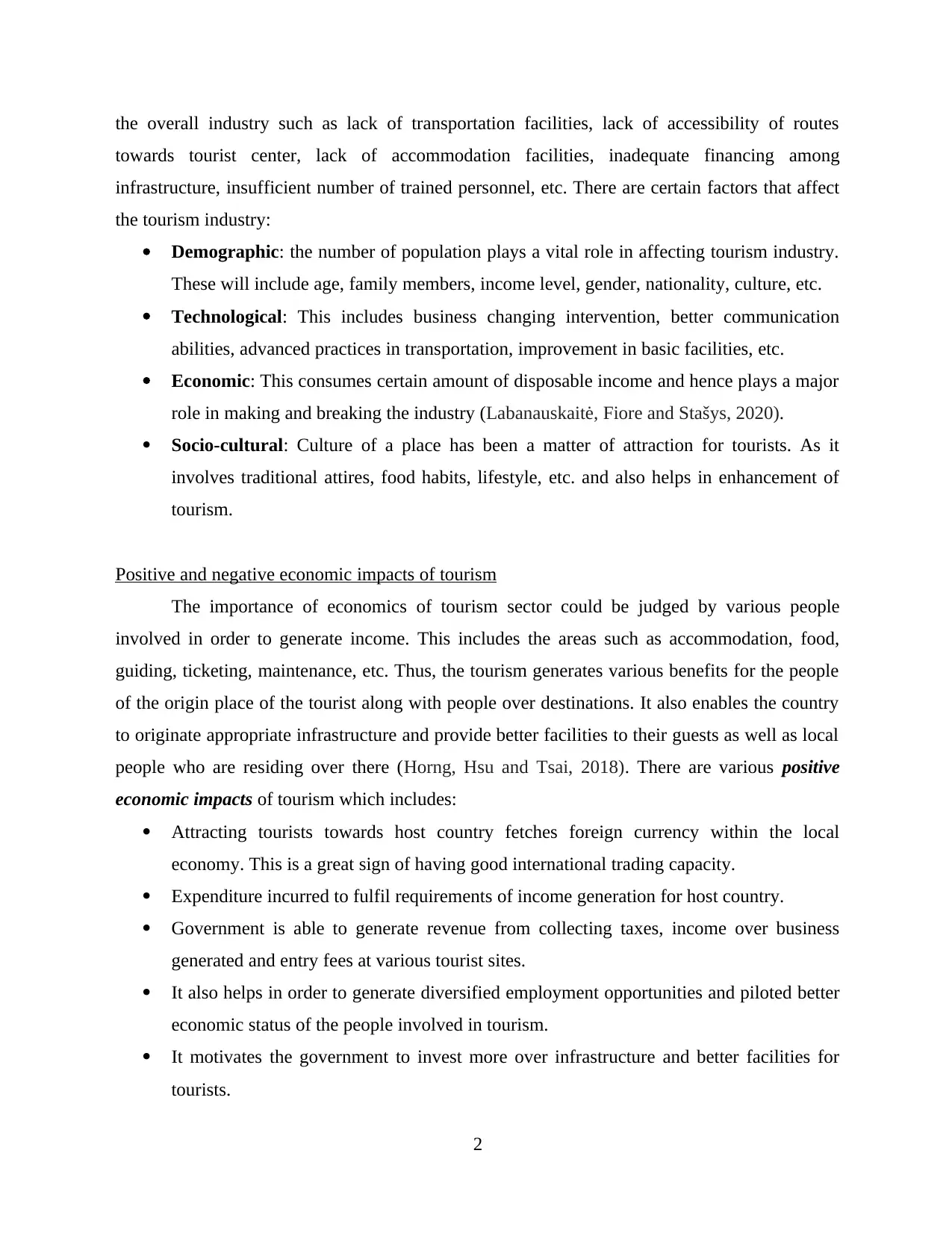
the overall industry such as lack of transportation facilities, lack of accessibility of routes
towards tourist center, lack of accommodation facilities, inadequate financing among
infrastructure, insufficient number of trained personnel, etc. There are certain factors that affect
the tourism industry:
Demographic: the number of population plays a vital role in affecting tourism industry.
These will include age, family members, income level, gender, nationality, culture, etc.
Technological: This includes business changing intervention, better communication
abilities, advanced practices in transportation, improvement in basic facilities, etc.
Economic: This consumes certain amount of disposable income and hence plays a major
role in making and breaking the industry (Labanauskaitė, Fiore and Stašys, 2020).
Socio-cultural: Culture of a place has been a matter of attraction for tourists. As it
involves traditional attires, food habits, lifestyle, etc. and also helps in enhancement of
tourism.
Positive and negative economic impacts of tourism
The importance of economics of tourism sector could be judged by various people
involved in order to generate income. This includes the areas such as accommodation, food,
guiding, ticketing, maintenance, etc. Thus, the tourism generates various benefits for the people
of the origin place of the tourist along with people over destinations. It also enables the country
to originate appropriate infrastructure and provide better facilities to their guests as well as local
people who are residing over there (Horng, Hsu and Tsai, 2018). There are various positive
economic impacts of tourism which includes:
Attracting tourists towards host country fetches foreign currency within the local
economy. This is a great sign of having good international trading capacity.
Expenditure incurred to fulfil requirements of income generation for host country.
Government is able to generate revenue from collecting taxes, income over business
generated and entry fees at various tourist sites.
It also helps in order to generate diversified employment opportunities and piloted better
economic status of the people involved in tourism.
It motivates the government to invest more over infrastructure and better facilities for
tourists.
2
towards tourist center, lack of accommodation facilities, inadequate financing among
infrastructure, insufficient number of trained personnel, etc. There are certain factors that affect
the tourism industry:
Demographic: the number of population plays a vital role in affecting tourism industry.
These will include age, family members, income level, gender, nationality, culture, etc.
Technological: This includes business changing intervention, better communication
abilities, advanced practices in transportation, improvement in basic facilities, etc.
Economic: This consumes certain amount of disposable income and hence plays a major
role in making and breaking the industry (Labanauskaitė, Fiore and Stašys, 2020).
Socio-cultural: Culture of a place has been a matter of attraction for tourists. As it
involves traditional attires, food habits, lifestyle, etc. and also helps in enhancement of
tourism.
Positive and negative economic impacts of tourism
The importance of economics of tourism sector could be judged by various people
involved in order to generate income. This includes the areas such as accommodation, food,
guiding, ticketing, maintenance, etc. Thus, the tourism generates various benefits for the people
of the origin place of the tourist along with people over destinations. It also enables the country
to originate appropriate infrastructure and provide better facilities to their guests as well as local
people who are residing over there (Horng, Hsu and Tsai, 2018). There are various positive
economic impacts of tourism which includes:
Attracting tourists towards host country fetches foreign currency within the local
economy. This is a great sign of having good international trading capacity.
Expenditure incurred to fulfil requirements of income generation for host country.
Government is able to generate revenue from collecting taxes, income over business
generated and entry fees at various tourist sites.
It also helps in order to generate diversified employment opportunities and piloted better
economic status of the people involved in tourism.
It motivates the government to invest more over infrastructure and better facilities for
tourists.
2
Paraphrase This Document
Need a fresh take? Get an instant paraphrase of this document with our AI Paraphraser
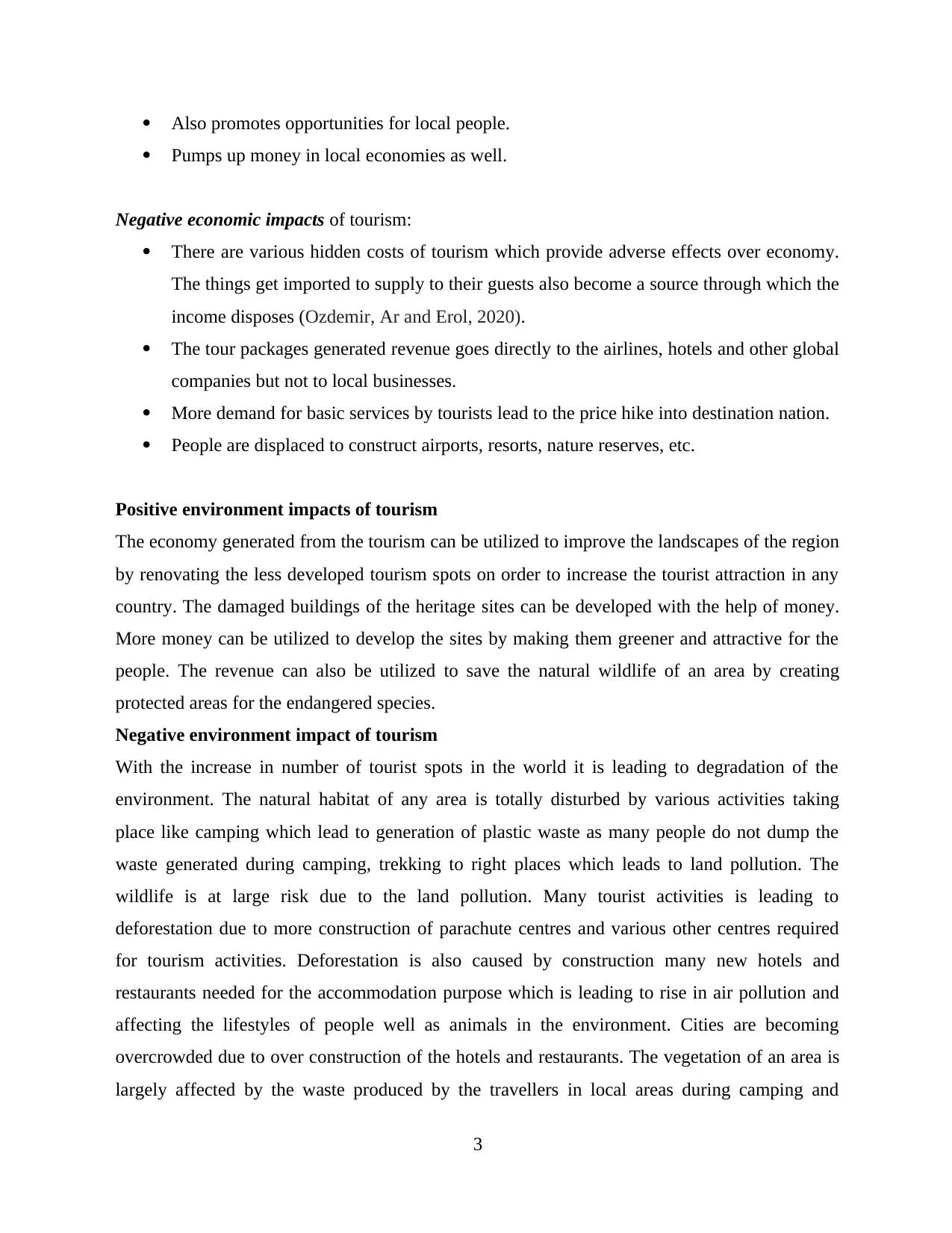
Also promotes opportunities for local people.
Pumps up money in local economies as well.
Negative economic impacts of tourism:
There are various hidden costs of tourism which provide adverse effects over economy.
The things get imported to supply to their guests also become a source through which the
income disposes (Ozdemir, Ar and Erol, 2020).
The tour packages generated revenue goes directly to the airlines, hotels and other global
companies but not to local businesses.
More demand for basic services by tourists lead to the price hike into destination nation.
People are displaced to construct airports, resorts, nature reserves, etc.
Positive environment impacts of tourism
The economy generated from the tourism can be utilized to improve the landscapes of the region
by renovating the less developed tourism spots on order to increase the tourist attraction in any
country. The damaged buildings of the heritage sites can be developed with the help of money.
More money can be utilized to develop the sites by making them greener and attractive for the
people. The revenue can also be utilized to save the natural wildlife of an area by creating
protected areas for the endangered species.
Negative environment impact of tourism
With the increase in number of tourist spots in the world it is leading to degradation of the
environment. The natural habitat of any area is totally disturbed by various activities taking
place like camping which lead to generation of plastic waste as many people do not dump the
waste generated during camping, trekking to right places which leads to land pollution. The
wildlife is at large risk due to the land pollution. Many tourist activities is leading to
deforestation due to more construction of parachute centres and various other centres required
for tourism activities. Deforestation is also caused by construction many new hotels and
restaurants needed for the accommodation purpose which is leading to rise in air pollution and
affecting the lifestyles of people well as animals in the environment. Cities are becoming
overcrowded due to over construction of the hotels and restaurants. The vegetation of an area is
largely affected by the waste produced by the travellers in local areas during camping and
3
Pumps up money in local economies as well.
Negative economic impacts of tourism:
There are various hidden costs of tourism which provide adverse effects over economy.
The things get imported to supply to their guests also become a source through which the
income disposes (Ozdemir, Ar and Erol, 2020).
The tour packages generated revenue goes directly to the airlines, hotels and other global
companies but not to local businesses.
More demand for basic services by tourists lead to the price hike into destination nation.
People are displaced to construct airports, resorts, nature reserves, etc.
Positive environment impacts of tourism
The economy generated from the tourism can be utilized to improve the landscapes of the region
by renovating the less developed tourism spots on order to increase the tourist attraction in any
country. The damaged buildings of the heritage sites can be developed with the help of money.
More money can be utilized to develop the sites by making them greener and attractive for the
people. The revenue can also be utilized to save the natural wildlife of an area by creating
protected areas for the endangered species.
Negative environment impact of tourism
With the increase in number of tourist spots in the world it is leading to degradation of the
environment. The natural habitat of any area is totally disturbed by various activities taking
place like camping which lead to generation of plastic waste as many people do not dump the
waste generated during camping, trekking to right places which leads to land pollution. The
wildlife is at large risk due to the land pollution. Many tourist activities is leading to
deforestation due to more construction of parachute centres and various other centres required
for tourism activities. Deforestation is also caused by construction many new hotels and
restaurants needed for the accommodation purpose which is leading to rise in air pollution and
affecting the lifestyles of people well as animals in the environment. Cities are becoming
overcrowded due to over construction of the hotels and restaurants. The vegetation of an area is
largely affected by the waste produced by the travellers in local areas during camping and
3
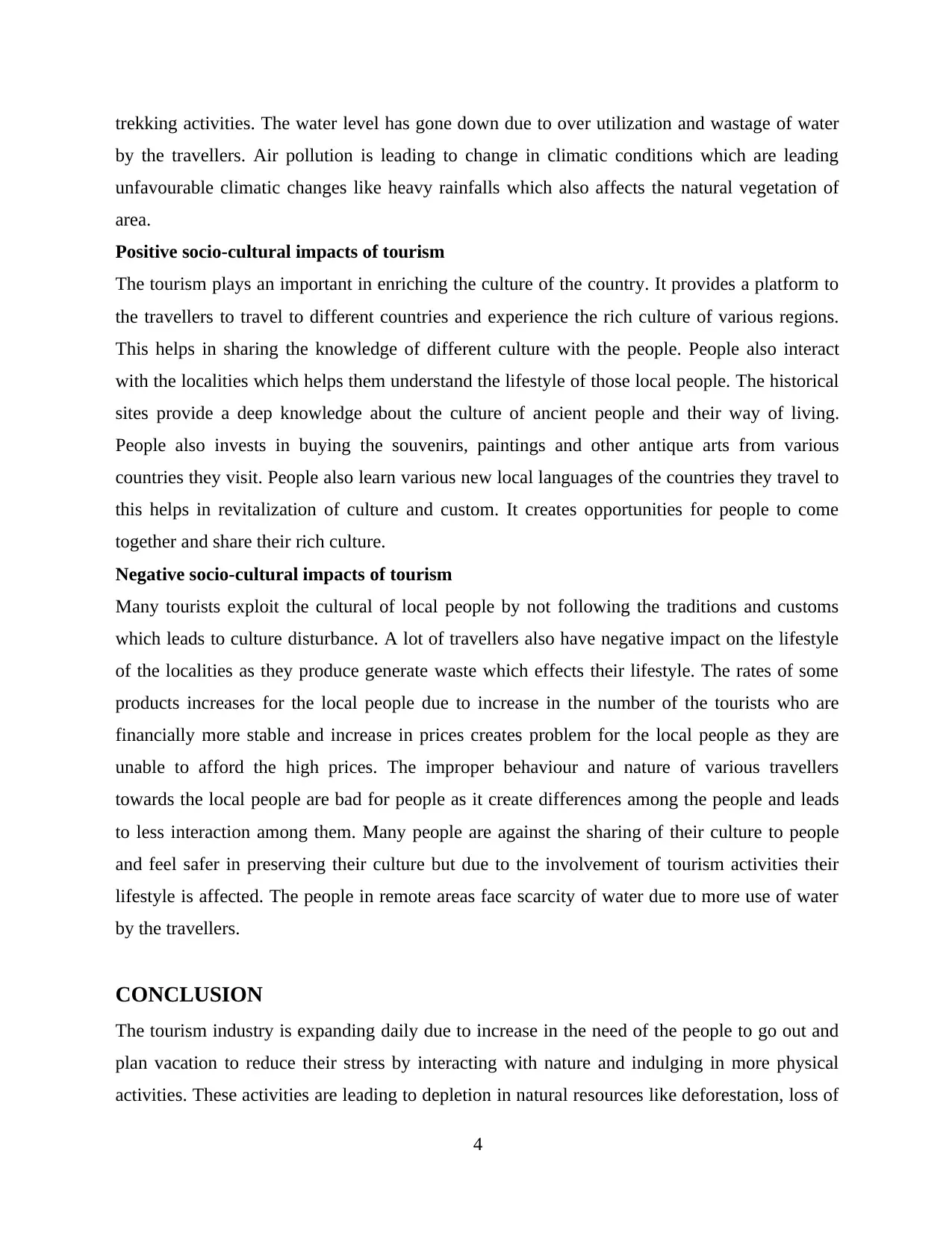
trekking activities. The water level has gone down due to over utilization and wastage of water
by the travellers. Air pollution is leading to change in climatic conditions which are leading
unfavourable climatic changes like heavy rainfalls which also affects the natural vegetation of
area.
Positive socio-cultural impacts of tourism
The tourism plays an important in enriching the culture of the country. It provides a platform to
the travellers to travel to different countries and experience the rich culture of various regions.
This helps in sharing the knowledge of different culture with the people. People also interact
with the localities which helps them understand the lifestyle of those local people. The historical
sites provide a deep knowledge about the culture of ancient people and their way of living.
People also invests in buying the souvenirs, paintings and other antique arts from various
countries they visit. People also learn various new local languages of the countries they travel to
this helps in revitalization of culture and custom. It creates opportunities for people to come
together and share their rich culture.
Negative socio-cultural impacts of tourism
Many tourists exploit the cultural of local people by not following the traditions and customs
which leads to culture disturbance. A lot of travellers also have negative impact on the lifestyle
of the localities as they produce generate waste which effects their lifestyle. The rates of some
products increases for the local people due to increase in the number of the tourists who are
financially more stable and increase in prices creates problem for the local people as they are
unable to afford the high prices. The improper behaviour and nature of various travellers
towards the local people are bad for people as it create differences among the people and leads
to less interaction among them. Many people are against the sharing of their culture to people
and feel safer in preserving their culture but due to the involvement of tourism activities their
lifestyle is affected. The people in remote areas face scarcity of water due to more use of water
by the travellers.
CONCLUSION
The tourism industry is expanding daily due to increase in the need of the people to go out and
plan vacation to reduce their stress by interacting with nature and indulging in more physical
activities. These activities are leading to depletion in natural resources like deforestation, loss of
4
by the travellers. Air pollution is leading to change in climatic conditions which are leading
unfavourable climatic changes like heavy rainfalls which also affects the natural vegetation of
area.
Positive socio-cultural impacts of tourism
The tourism plays an important in enriching the culture of the country. It provides a platform to
the travellers to travel to different countries and experience the rich culture of various regions.
This helps in sharing the knowledge of different culture with the people. People also interact
with the localities which helps them understand the lifestyle of those local people. The historical
sites provide a deep knowledge about the culture of ancient people and their way of living.
People also invests in buying the souvenirs, paintings and other antique arts from various
countries they visit. People also learn various new local languages of the countries they travel to
this helps in revitalization of culture and custom. It creates opportunities for people to come
together and share their rich culture.
Negative socio-cultural impacts of tourism
Many tourists exploit the cultural of local people by not following the traditions and customs
which leads to culture disturbance. A lot of travellers also have negative impact on the lifestyle
of the localities as they produce generate waste which effects their lifestyle. The rates of some
products increases for the local people due to increase in the number of the tourists who are
financially more stable and increase in prices creates problem for the local people as they are
unable to afford the high prices. The improper behaviour and nature of various travellers
towards the local people are bad for people as it create differences among the people and leads
to less interaction among them. Many people are against the sharing of their culture to people
and feel safer in preserving their culture but due to the involvement of tourism activities their
lifestyle is affected. The people in remote areas face scarcity of water due to more use of water
by the travellers.
CONCLUSION
The tourism industry is expanding daily due to increase in the need of the people to go out and
plan vacation to reduce their stress by interacting with nature and indulging in more physical
activities. These activities are leading to depletion in natural resources like deforestation, loss of
4
⊘ This is a preview!⊘
Do you want full access?
Subscribe today to unlock all pages.

Trusted by 1+ million students worldwide
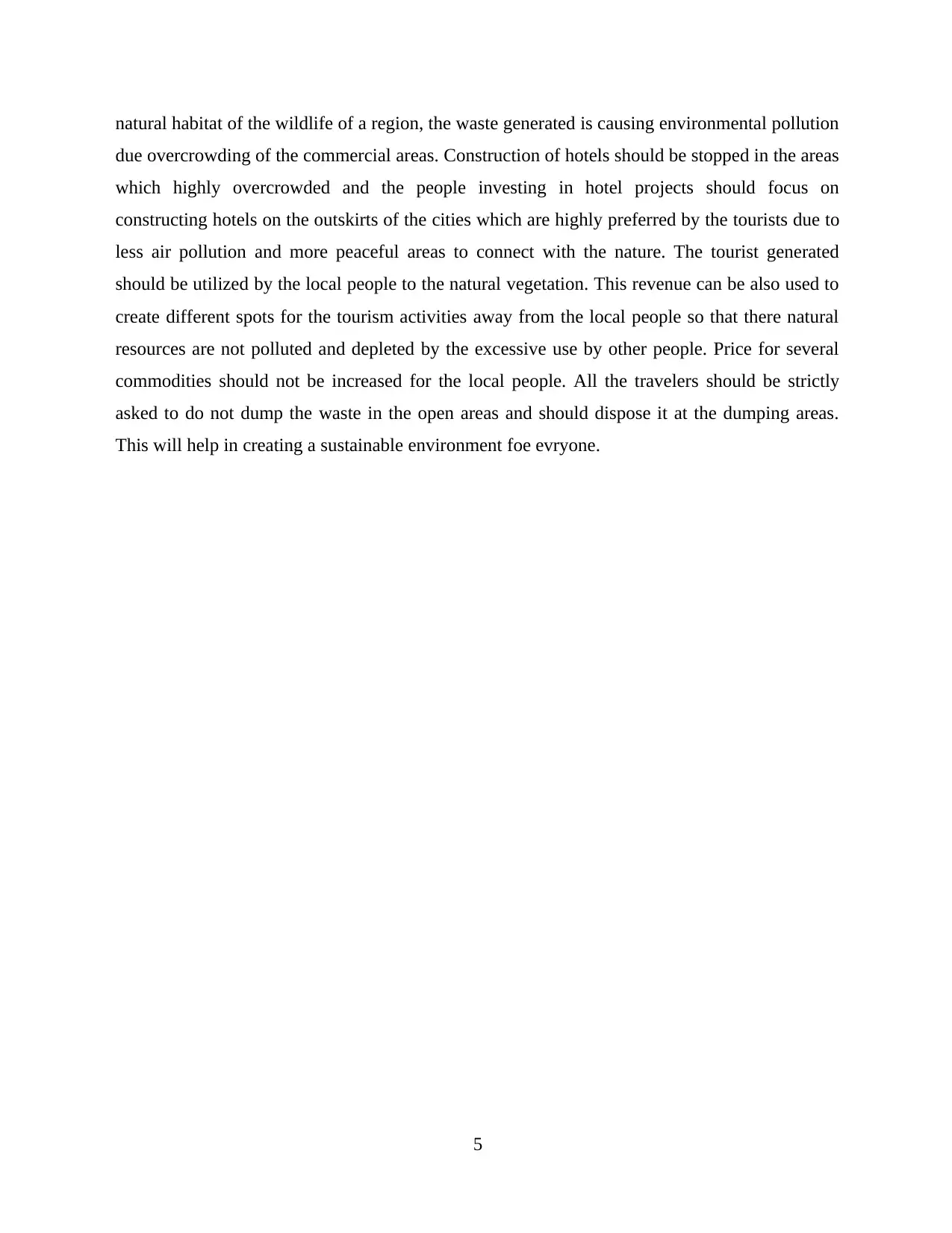
natural habitat of the wildlife of a region, the waste generated is causing environmental pollution
due overcrowding of the commercial areas. Construction of hotels should be stopped in the areas
which highly overcrowded and the people investing in hotel projects should focus on
constructing hotels on the outskirts of the cities which are highly preferred by the tourists due to
less air pollution and more peaceful areas to connect with the nature. The tourist generated
should be utilized by the local people to the natural vegetation. This revenue can be also used to
create different spots for the tourism activities away from the local people so that there natural
resources are not polluted and depleted by the excessive use by other people. Price for several
commodities should not be increased for the local people. All the travelers should be strictly
asked to do not dump the waste in the open areas and should dispose it at the dumping areas.
This will help in creating a sustainable environment foe evryone.
5
due overcrowding of the commercial areas. Construction of hotels should be stopped in the areas
which highly overcrowded and the people investing in hotel projects should focus on
constructing hotels on the outskirts of the cities which are highly preferred by the tourists due to
less air pollution and more peaceful areas to connect with the nature. The tourist generated
should be utilized by the local people to the natural vegetation. This revenue can be also used to
create different spots for the tourism activities away from the local people so that there natural
resources are not polluted and depleted by the excessive use by other people. Price for several
commodities should not be increased for the local people. All the travelers should be strictly
asked to do not dump the waste in the open areas and should dispose it at the dumping areas.
This will help in creating a sustainable environment foe evryone.
5
Paraphrase This Document
Need a fresh take? Get an instant paraphrase of this document with our AI Paraphraser
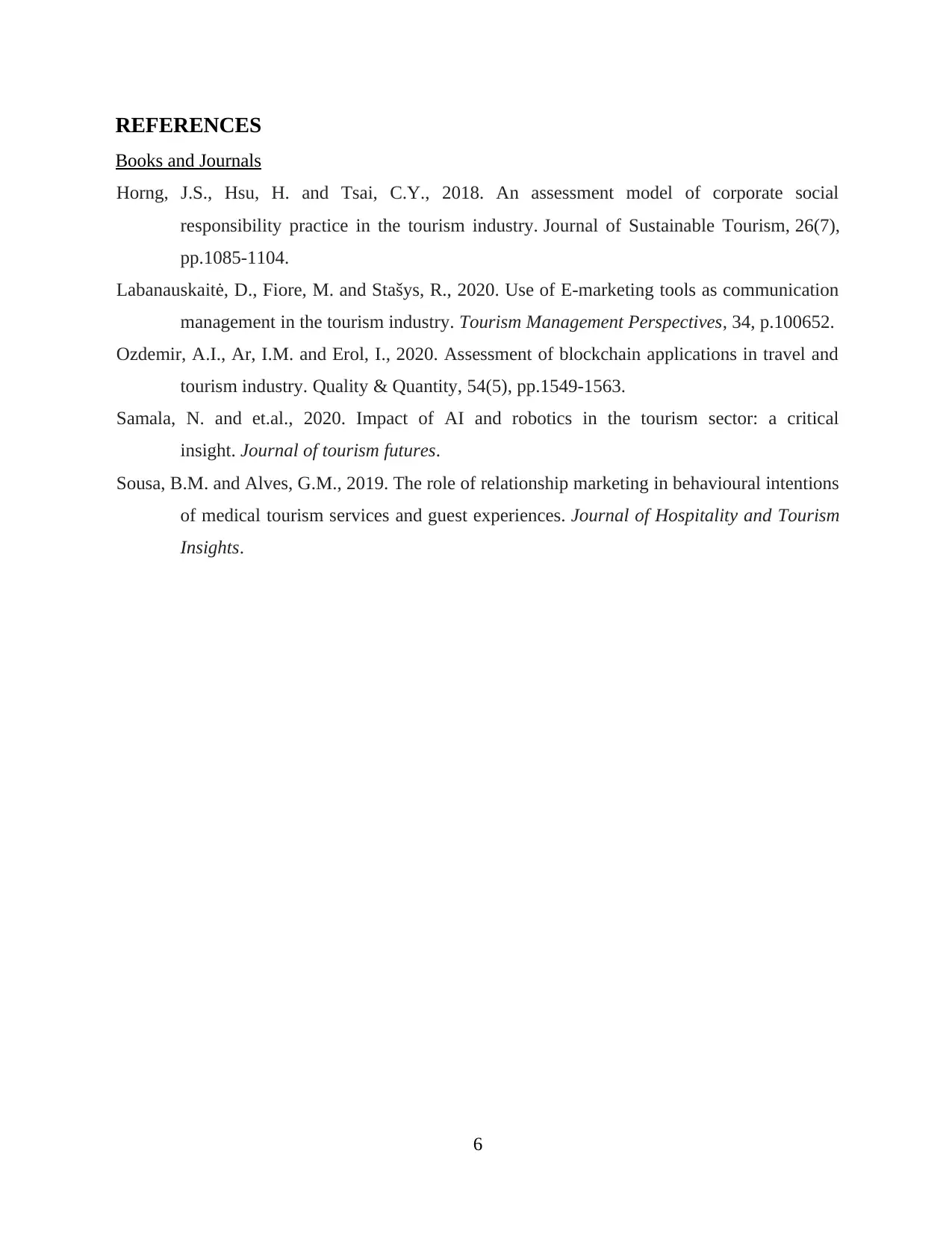
REFERENCES
Books and Journals
Horng, J.S., Hsu, H. and Tsai, C.Y., 2018. An assessment model of corporate social
responsibility practice in the tourism industry. Journal of Sustainable Tourism, 26(7),
pp.1085-1104.
Labanauskaitė, D., Fiore, M. and Stašys, R., 2020. Use of E-marketing tools as communication
management in the tourism industry. Tourism Management Perspectives, 34, p.100652.
Ozdemir, A.I., Ar, I.M. and Erol, I., 2020. Assessment of blockchain applications in travel and
tourism industry. Quality & Quantity, 54(5), pp.1549-1563.
Samala, N. and et.al., 2020. Impact of AI and robotics in the tourism sector: a critical
insight. Journal of tourism futures.
Sousa, B.M. and Alves, G.M., 2019. The role of relationship marketing in behavioural intentions
of medical tourism services and guest experiences. Journal of Hospitality and Tourism
Insights.
6
Books and Journals
Horng, J.S., Hsu, H. and Tsai, C.Y., 2018. An assessment model of corporate social
responsibility practice in the tourism industry. Journal of Sustainable Tourism, 26(7),
pp.1085-1104.
Labanauskaitė, D., Fiore, M. and Stašys, R., 2020. Use of E-marketing tools as communication
management in the tourism industry. Tourism Management Perspectives, 34, p.100652.
Ozdemir, A.I., Ar, I.M. and Erol, I., 2020. Assessment of blockchain applications in travel and
tourism industry. Quality & Quantity, 54(5), pp.1549-1563.
Samala, N. and et.al., 2020. Impact of AI and robotics in the tourism sector: a critical
insight. Journal of tourism futures.
Sousa, B.M. and Alves, G.M., 2019. The role of relationship marketing in behavioural intentions
of medical tourism services and guest experiences. Journal of Hospitality and Tourism
Insights.
6
1 out of 8
Related Documents
Your All-in-One AI-Powered Toolkit for Academic Success.
+13062052269
info@desklib.com
Available 24*7 on WhatsApp / Email
![[object Object]](/_next/static/media/star-bottom.7253800d.svg)
Unlock your academic potential
Copyright © 2020–2026 A2Z Services. All Rights Reserved. Developed and managed by ZUCOL.


